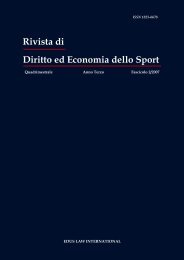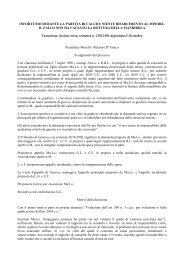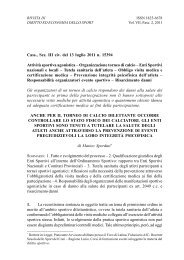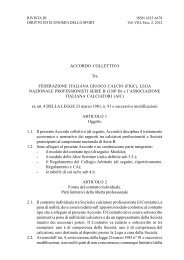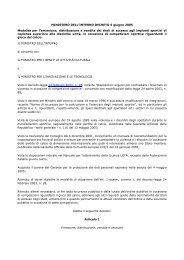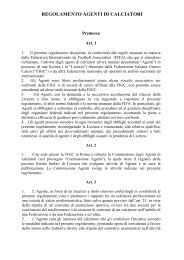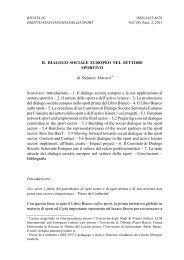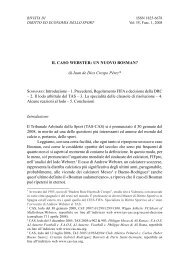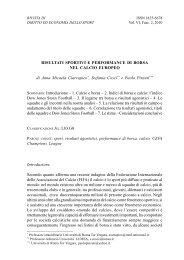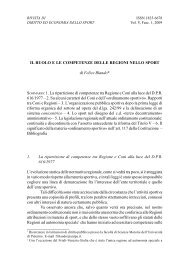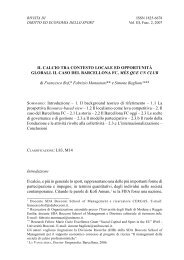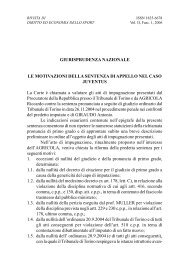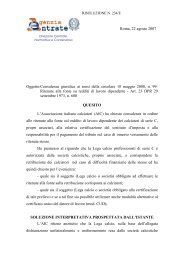European Sports Law and Policy Bulletin THE BERNARD ... - Slpc.eu
European Sports Law and Policy Bulletin THE BERNARD ... - Slpc.eu
European Sports Law and Policy Bulletin THE BERNARD ... - Slpc.eu
Create successful ePaper yourself
Turn your PDF publications into a flip-book with our unique Google optimized e-Paper software.
146 Michele ColucciThe Court chooses a line of reasoning which does not consider the broaderimplications of the case on employment <strong>and</strong>, in particular, its impact on training ofyoung people in the workplace in general. It does so for a practical reason: «theCourt did not hear sufficient submissions to deal with the wider issue adequately» 12<strong>and</strong> then because the specific characteristics of sport «must, however, be consideredcarefully when examining possible justifications for any such restriction – just asthe specific characteristics of any other sector would need to be borne in mindwhen examining the justification of restrictions applicable in that sector». 13The Court refers to the new legal basis of the Treaty on Sport (art. 165TFEU) 14 rightly stressing the fact that professional football is not merely aneconomic activity but also a matter of considerable social importance in <strong>European</strong>d, in this perspective, training <strong>and</strong> recruitment of young players should beencouraged rather than discouraged. 15Thus a training compensation represents the justification of the obstacle tofreedom of movement.Already in the Bosman case the Court held that the prospect of receivingtraining fees is likely to encourage football clubs to seek new talent <strong>and</strong> trainyoung players. 16 The returns on the investments in training made by the clubsproviding it are uncertain by their very nature since the clubs bear the expenditureincurred in respect of all the young players they recruit <strong>and</strong> train, sometimes overseveral years, whereas only some of those players undertake a professional careerat the end of their training, whether with the club which provided the training oranother club.Nevertheless the costs generated by training young players are, in general,only partly compensated for by the benefits which clubs can derive from thoseplayers during their training period.Under those circumstances, the clubs which provided the training could bediscouraged from investing in the training of young players if they could not obtainreimbursement of the amounts spent for that purpose where, at the end of histraining, a player enters into a professional contract with another club.In particular, that would be the case with small clubs providing training,whose investments at local level in the recruitment <strong>and</strong> training of young playersare of considerable importance for the social <strong>and</strong> educational function of sport. 17On the basis of this reasoning the judges conclude that a scheme providingfor the payment of compensation for training where a young player, at the end ofhis training, signs a professional contract with a club other than the one whichtrained him can, in principle, be justified by the objective of encouraging the____________________12AG, Opinion, Olympique Lyonnais v Olivier Bernard <strong>and</strong> Newcastle United FC, C-325/08, para.31.13AG, Idem, para 30.14ECJ, Bernard, para. 40.15ECJ, Bernard, para. 41; ECJ, Bosman, para. 108.16ECJ, Bernard, para. 42; ECJ, Bosman, para. 109.17ECJ, Bernard, paras 43-44.<strong>European</strong> <strong>Sports</strong> <strong>Law</strong> <strong>and</strong> <strong>Policy</strong> <strong>Bulletin</strong> 1/2010 - Chapter VIII147



